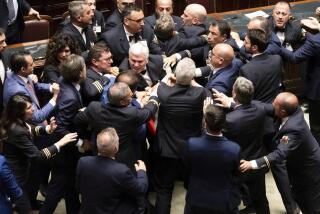Lawmakers’ Fracas Disrupts Russian Congress : Politics: Members were just letting off steam, some say. But others see it as the opening round in a battle for power.
- Share via
MOSCOW — Russia’s Parliament dissolved into a schoolyard shoving match Thursday in what some lawmakers dismissed as emotional catharsis but others took as a harbinger of civil conflict.
“It has been said for a long time that, if you violate the law, there will be civil war,” said Anatoly Shabad, a silver-haired physicist who lost his spectacles near the center of the fray. “This is the prologue.”
Opposition member Victor Aksyuchits observed, “This clash marked the beginning of an open fight for power.”
The scuffle that came close to a mass brawl occurred at the third session of the Congress of People’s Deputies, the biannual, 1,041-member Parliament that convened this week in the Kremlin. The several dozen deputies involved threw no actual punches and no one was hurt.
But the fracas reflected the mounting heat in the battle between Russian President Boris N. Yeltsin’s backers and his political enemies.
“Get out of here! Get out of here!” Parliament Chairman Ruslan I. Khasbulatov shouted furiously at one point as his raised platform in the airy hall of the Grand Kremlin Palace was besieged by deputies. Yeltsin left the hall as the fight broke out.
The pushing match began in a dispute over the type of voting to be used when the Congress decides on several laws that would strip Yeltsin of some of his powers and hand them to the more conservative legislature.
Yeltsin’s supporters condemned the proposed laws as a “quiet coup,” saying they would deprive the president of the ability to carry out the economic reforms that he believes will bring Russia to capitalist prosperity. The Yeltsin camp was already smarting, having listened for two days as deputy after deputy took the floor and accused Yeltsin’s Cabinet of bungling its reforms.
Then Khasbulatov, eager to slip through the laws that would make him and his Parliament stronger, manipulated the confused Congress into approving a secret ballot--thus increasing the chances that deputies cowed by Yeltsin would defy him and vote for the laws that would cripple him.
That was too much for the president’s allies. Several rushed forward to berate Khasbulatov, who told them repeatedly to sit down and finally called for other deputies to come forward and defend him.
“This is just terrorism!” deputies sitting nearby heard him say. “Protect me!”
At that, several members of Yeltsin’s opposition rushed forward and tried to pull back the deputies surrounding Khasbulatov. Within seconds, the chairman’s podium was surrounded by a jostling, surging mass of lawmakers.
Khasbulatov panicked and announced an emergency break.
The session is due to reconvene this morning.
Several lawmakers, flushed and wide-eyed as they left the hall, said they did not take the fight seriously, and they pointed out that debate degenerates into body blows in many of the world’s parliaments.
“I think this was a psychological catharsis after a few days of tension,” said Yeltsin adviser Sergei Stankevich. “And tomorrow, with a fresh and cool head, deputies will be back to more usual work and find a compromise.”
Vladimir Lukin, Russia’s ambassador to the United States, commented that “Russia is a fresh democracy, so fist-fighting is very active.”
But others warned that the scuffle was an echo of Russia’s deep unquiet in these months of difficult reforms. “This crisis is a reflection of what’s happening in the country and nothing else,” opposition member Ilya Konstantinov said.
Deputies from across Russia brought messages of discontent to Congress, demanding changes in everything from the banking system to members of Yeltsin’s personal entourage.
Yeltsin’s reformers take the approach that “we will build a market at any price, even if there is not a single person who can buy in that market,” complained Nikolai Travkin, head of the Democratic Party of Russia.
A panel charged with formulating the Congress’ assessment of Yeltsin’s reforms issued a draft pronouncing them “unsatisfactory” and against “the people’s” interest. The draft had yet to be voted on, but it indicated that Yeltsin and his reformist prime minister, Yegor T. Gaidar, were in trouble.
Gaidar got in some final blows in a last speech accusing his opponents of trying to push Russia back toward the old Communist system.
“It is suggested,” he said, “that as part of the reforms, we give up private property on land, stop privatization, freeze prices and wages, restore the state planning committee and demand obedience from the former (Soviet) republics.
“Obviously, our nation does not need such reforms,” Gaidar said sarcastically.
Yeltsin is expected today to ask the Congress to confirm Gaidar--technically, he had only been acting prime minister until now--in what would be the most critical test so far of whether lawmakers would allow Yeltsin’s radical reforms to continue.
More to Read
Sign up for Essential California
The most important California stories and recommendations in your inbox every morning.
You may occasionally receive promotional content from the Los Angeles Times.













